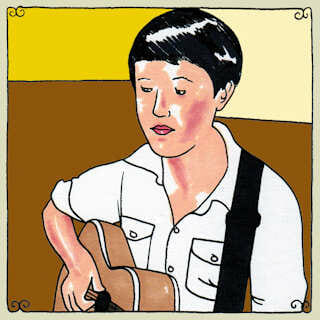- Welcome to Daytrotter
- Famous Blue Raincoat
- That Day
- Set The Tigers Free
- I Saw The Dead
It’s the minutiae of his every day that Conor J. O’Brien finds enthralling. It’s what he bends an ear for and it’s where he finds that he’s the most curious and the most alert. It’s his greatest source of nourishment, that which sits atop his food pyramid well above the fruits, vegetables, grains and dairy. What this makes the young singer and songwriter is a remarkably gifted writer – one who through his own close read and probing introspection is able to parse out gorgeous universal truths that often go unsaid or unarticulated. He plumbs the depths not just of himself, but of each and every word spoken, word used, facial expression, historic precedence, touch, sigh, laugh and brush-off. The Irish lad finds in these parts the pieces of himself that are mysteriously secretive, afraid of the light, and he gives them over as evidence. He gives them over as if they were bloody knives or handkerchiefs – things to get away from or things to offer as help or condolence. They serve the purposes of being offerings and evidence, making us believe that his mind is a pushing match or a battlefield, not a soft bed. It’s not a place for rest, but a place filled with slings and arrows, tossing and turning and gripping tugs of war taking occurring at all hours of the day and night.
He feels animals roaming through his body. He stops them for questioning and they either take a chunk of skin with them, at the sharp end of their claws, or they answer his questions, and he gets a little closer to the secret at the end of the tunnel. He sees and feels his love as a living thing – something with a mind of its own – a wounded thing and a wounder, all the same, the victim and the victimizer. He feels himself on fire, doing a little bit of all of the following: standing aback taking photographs of the magnificent blaze, fanning the flames and trying desperately to put the damned thing out, but all that’s available is a thimble and a water fountain.
We have a tendency to hear his songs and think that he’s sad. It could be. It really could, but what O’Brien’s writing seems to communicate to us most of the time is an abundance of emotion that’s all of everything. He’s just as in touch with his happiness as he is with his sadness and that in and of itself is what makes the emotions that he expresses so vibrant and present. His songs are strong personalities, given to great tears, horrendous hangovers and ecstasy, for they are able to tip the scales in favor of a cocktail of emotions, all at once. It’s more than one man can possibly take, or live with. O’Brien has a real desire to understand why the contradictions exist, why they feed and why they overcome us. He wants there to be explanations for good and evil, for love and pain all being relatively the same, just with distinctions that are barely recognizable. He sings on “To Be Counted Among Men,” “Young Paul decides upon a future/And he asks from her a favour/He wants to know if she will tell him/If he’s for hell or he’s for heaven/If he’s not for hell he’ll show no sorrow/Until he’s born again tomorrow/If he’s for heaven there’s no reason/To lament the passing season/She says, ‘Don’t be a fool, son. There aren’t any rules, son.’/And as she spoke, he lost his faith.” The explanations aren’t there, for anyone. Faith just becomes scarcer and scarcer in the world of Villagers.
